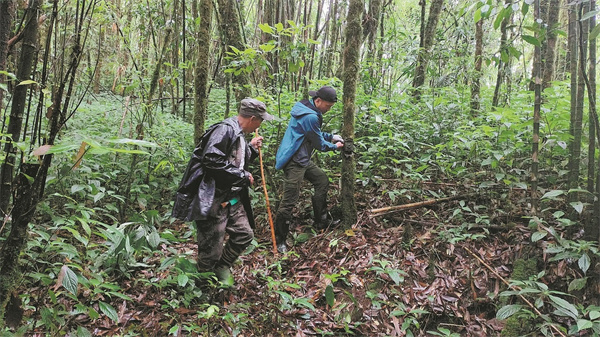Biodiversity surveys help Jeling draw nature lovers
Updated: 2024-05-13 (chinadaily.com.cn)  Print
Print 



An employee (right) with the Shan Shui Conservation Center and a villager from Jeling village set up infrared cameras in a forest in Metog county, Xizang autonomous region. [Provided to chinadaily.com.cn]
The proximity to a well-preserved primitive forest, improved infrastructure and the local people's openness to new ideas have all played an important role in attracting researchers and conservationists to Jeling village in Metog county, Xizang autonomous region. Some have not only come to visit, but also have opted to stay long term for their work.
Wei Chunyue is one of them.
After getting her master's degree in the United States, Wei, a lifelong nature enthusiast, spent a year working with an international conservation organization based in the US.
Later, she returned to China and started working with the Shan Shui Conservation Center, a Chinese nongovernmental conservation organization, in March 2021. The NGO, dedicated to species and ecosystem conservation to resolve the problem of human and nature coexistence, opened a workstation in Jeling in April 2022.
Metog is part of the Yarlung Zangbo Grand Canyon region, which holds immense value as a focal point for studying and preserving biodiversity on our planet, Wei said. The region stands as one of the world's 34 foremost biodiversity hotspots.
At first, only one employee was stationed in the village. In March last year, Wei and three of her colleagues arrived in Jeling for a two-year stay.
"I am mainly responsible for managing the data we collect in the whole area," Wei said. "The other colleagues are responsible for conducting field surveys — setting up infrared cameras for wildlife monitoring and research in the forests and then regularly visiting the cameras to receive data."
Last year, they managed about 100 cameras in Metog and neighboring counties, including Bomi and Manling, in Nyingchi city, Xizang. This year, the number of cameras has increased to 180, she said, adding that she sometimes joins her colleagues to conduct bird surveys.A sign set up at a platform overlooking the tea garden in Jeling provides information about the area's rich biodiversity and local culture.
Another significant aspect of their work involves offering guidance to the villagers who are striving to establish sustainable ecotourism practices. This includes offering advice on the design and development of tourist routes.
"We are assisting them in upgrading two natural and cultural experience routes, while also enhancing the skills of local guides to effectively showcase the beauty of nature to visiting tourists," she said.
One is a hiking route into a forest of Bhutan pine trees, where a 76.8-meter Bhutan pine was once designated the mainland's tallest tree, near the village. Thanks to the discovery of the "tree king" in April 2022, the surrounding forest has become the most popular tourist site in Jeling.
The other route leads to a platform overlooking the village's tea garden. On a clear day, visitors can see majestic Mount Namjagbarwa looming behind the slopes.
With deeper insight into the area's fauna and flora, Wei and her colleagues can help the village post signs providing information about the area's rich biodiversity for tourists. The signs can, for example, introduce a variety of wild orchids distributed in the area to visitors as they stroll through the forest of the "tree king".
To raise the villagers' environmental awareness, Shan Shui began collaborating with the local government in an effort to reintroduce orchids to the wild in April 2022. Wei said the residents of Jeling used to have a penchant for collecting wild orchids found in the forest and planting them in their courtyards.
As part of the reintroduction project, each of the village's 28 families is encouraged to donate three to five pots of orchids from their courtyards, which are then replanted in their natural habitat. The villagers are urged to participate in the replanting events, which are held three times a year. "It's like a group outing," Wei said. "We collect the orchids in the early morning and then head to the forest and replant them together with their donators."
chenliang@chinadaily.com.cn








